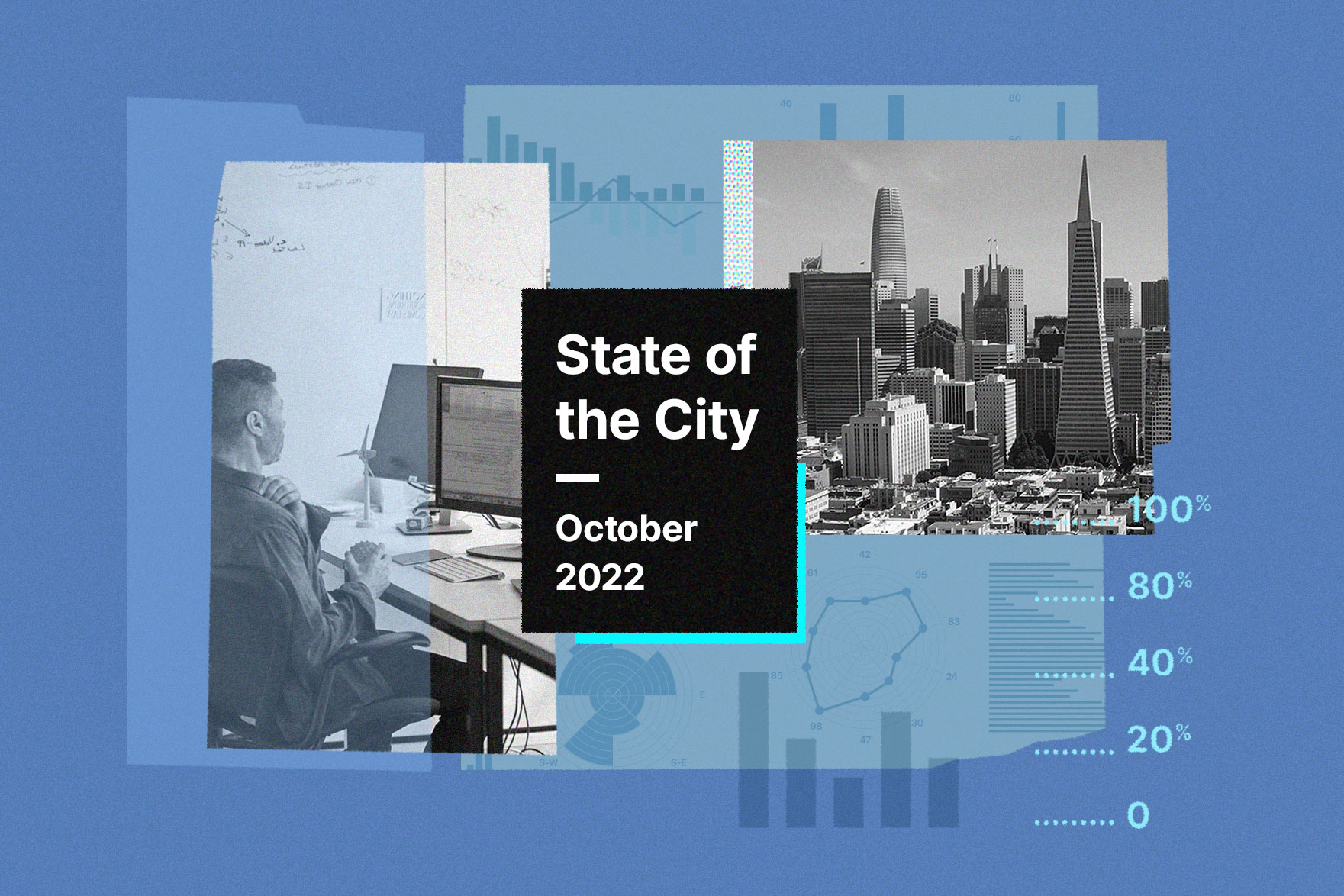Editor’s Note: Every month, The Standard’s “State of the City” dashboard analyzes the outlook for San Francisco by monitoring data on the city’s economy, health, crime, housing and other key performance indicators.
In yet another blow to the San Francisco economy, venture capitalists have thrown the brakes on startup funding.
Nationwide, third-quarter VC investments are running about half of what they did at the beginning of 2022, and the number of deals is down by about one-third, according to new data from PitchBook.
In San Francisco, investments are down 54%, and deals are off by 40%, even as thousands of startup investors and founders gather at Moscone Center for the industry’s TechCrunch Disrupt conference.
San Francisco is doing its best to hold on to a substantial slice of that shrinking pie. Startups in the city account for half of all SF Bay Area and 13.5% of U.S. venture funding.
The embarrassing part? LA now attracts more startup backing than the city of SF—and NY is right on its heels.
Granted, the LA and NY figures are regional and more comparable to that of the SF Bay Area. But the third quarter data is the first time that other regions have gained on SF, the long-standing capital of venture-backed innovation in America and around the world.
To be sure, SF’s VC activity is still worthy of envy. Despite the dropoff during 2022, the value of third-quarter deals is still greater than that of the fourth quarter of 2019.
“San Francisco’s declines are likely to look bigger because SF has far and away the most deals in any quarter and its number of investors and the amount of capital available is much higher than other markets,” Kyle Stanford, Senior VC Analyst at PitchBook. “San Francisco, for all of the bad narrative, is still the main locality for VC.”
The pullback stems from this year’s downturn in financial markets, which means venture capitalists have little chance to recoup their investment in startups with an “exit”—typically an initial public stock offering (IPO) or acquisition.
However, if Adobe’s September acquisition of Figma closes as planned, the $20 billion deal will be logged as the biggest-ever exit of a venture-backed company. The deal will push the city’s exits into a healthier range and might dust off the city’s reputation as the epicenter of the startup gold rush.
Though the slowdown in VC funding shows up across the board, established startups have been the hardest hit. Funding for the earliest startups—those backed with “angel” and “seed” rounds—has not dropped as significantly as that of “early stage” and “late stage” startups which require bigger rounds of capital to stay afloat.
VC support for SF’s youngest companies is a bright spot for the city: Investments in seed and angel rounds for the first three quarters of 2022 have already reached 2021 levels. And that means another 400 startups have been born in San Francisco this year alone.
With the proliferation of remote work, some venture capitalists are not as concerned with the location of a startup’s headquarters anymore. The need to be in a certain geography is not as critical as it used to be now that talent can be recruited worldwide.
“The ability to make deals over Zoom has changed VC quite a bit. It was a major reason why the 2020 deal count boomed through the second half of the year and why 2021 deals occurred at a faster pace than ever before,” says PitchBook’s Stanford. “It’s now just as easy to invest in a company down the street as it is on the opposite coast.”
But the city of San Francisco would very much like to keep new startups settling in town. Filling empty office buildings and re-energizing a dormant downtown will be key to filling coffers with tax revenue from VC-rich startups.
State of the City: October 2022
The Latest Indicators Impacting the Outlook for San Francisco
Consumer Prices
Prices in the San Francisco and East Bay areas in August began to decline from those recorded in June.
Gas Prices
SF gas prices may be declining from another $6-plus-per-gallon peak last month.
Unemployment
After hitting a low of 1.9% in May, SF’s unemployment rate climbed slightly to 2.3% in August though that is still considered extremely low by economists.
Layoffs
Salesforce joined the ranks of SF companies cutting staff, bringing 2022 layoffs to more than 13,000. Read the latest on The Standard’s Layoff Tracker.
SF Stocks
Tech stocks continue to slide, with Nasdaq continuing the downward trajectory it began earlier this summer.
Venture Capital
Indeed, VC deals have declined dramatically since the beginning of 2022, but the current deal levels match that of early 2020.
Correction: An earlier version of this story misidentified the headquarters of Adobe.
